Turtle Beach Atlas Air review
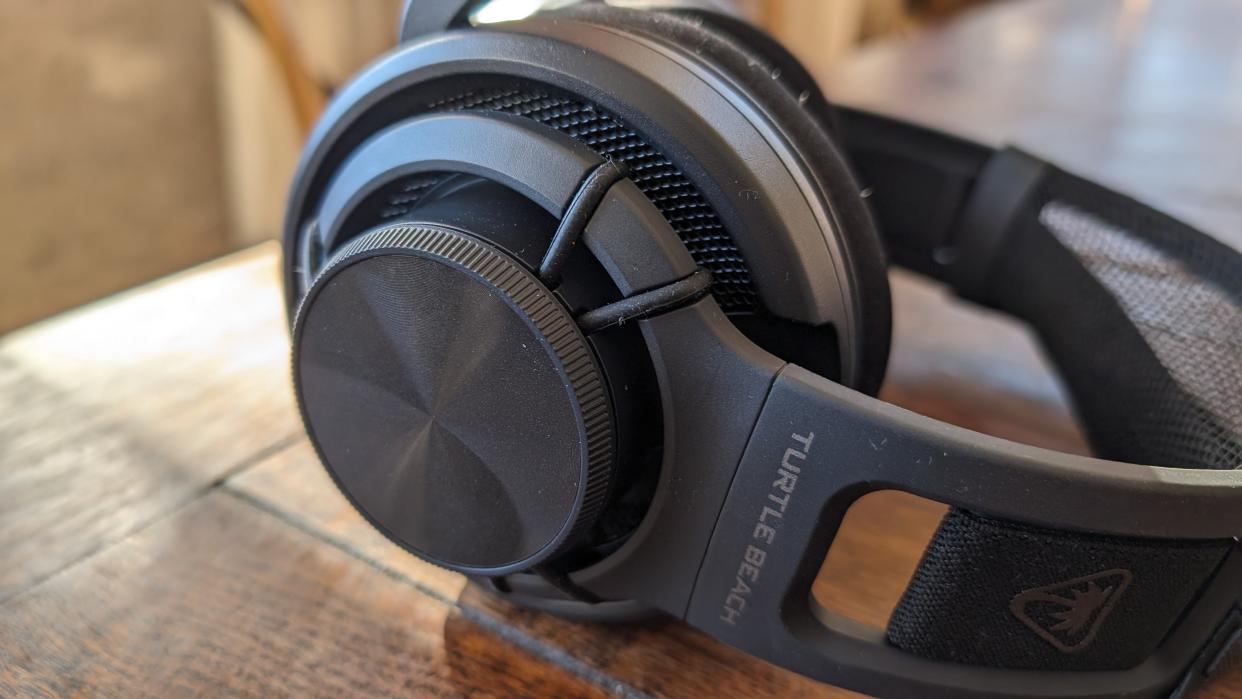
Out of the box the Atlas Air is an underwhelming affair. It's an open-back wireless gaming headset with much emphasis placed on its lightness, which explains its pared back look. It weighs a light 301 grams and, compared to some of the competition in this price range, it definitely feels less like an expensive jewel in the hands and more like a blunt weapon.
Don't expect fancy swivel cups with joints that will likely wear in a couple of years: this thing feels like you could pull it out like a snap band. People with enormous heads, you're in luck. Pushers, shovers, known klutzes: this may be for you.
This utilitarian approach extends to its interface. The left cup has a big volume wheel attached, meaning you'll never accidentally unpair your headset or switch it to Bluetooth mode while adjusting the volume. The detachable mic is a pull back to mute affair, and I think few would argue with the brute simplicity of this approach.
There's a power button and two buttons that toggle between Bluetooth and wireless modes, and an LED denoting power or a near-spent battery. Its battery has an advertised 50 hour life, and I only charged it twice during the three weeks I spent using it.
Atlas Air specs
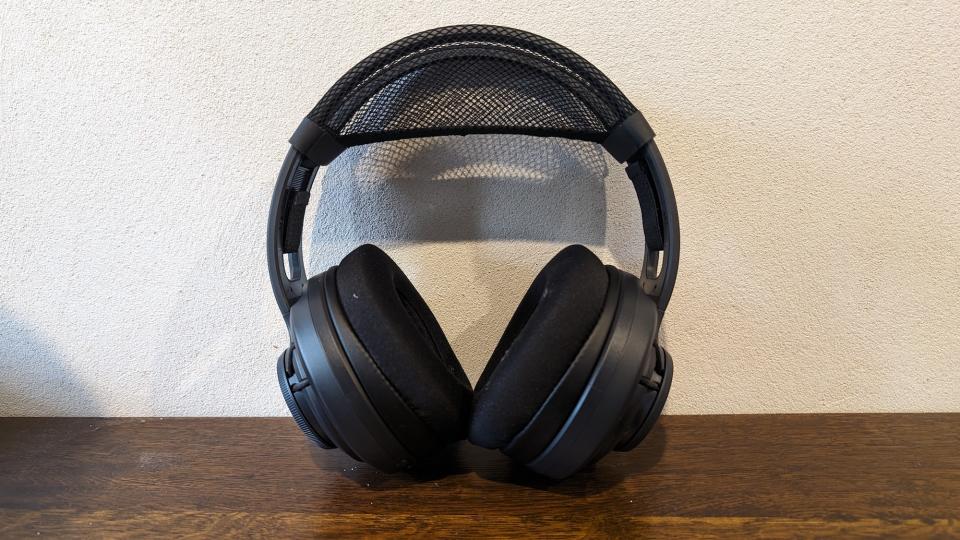
Connection: 2.4GHz wireless (Type-C dongle), Bluetooth 5.2, USB Type-C cable, 3.5mm analogue cable
Type: Over-ear, open-back
Frequency response: 20 - 40,000hz
Drivers: 40mm with Waves 3D Audio
Microphone: Uni-directional 16-bit 32kHz high-bandwidth
Weight: 301 g
Price: $150 / £160 / AU$299
The overall impression is of a headset that promises to work. It's aesthetically restrained, and the polyurethane shell doesn't feel expensive in the hand. Its headband is made of a flexible mesh that some may clock as cheap, until its benefits shine through. This band is adjustable with velcro and is probably the main contributing factor towards both the Atlas Air's lightness and its superlative comfort during long gaming sessions.
It's hard to convey objective 'comfort' when it comes to headsets because a lot tends to rest on the size of one's skull and one's habits using it, but as a big skulled man who spent upwards of four hours in-session at a time for this review, I don't think I've ever felt as unencumbered.
I mean, look how far these cans stretch out. There is 300mm between the cushions here:
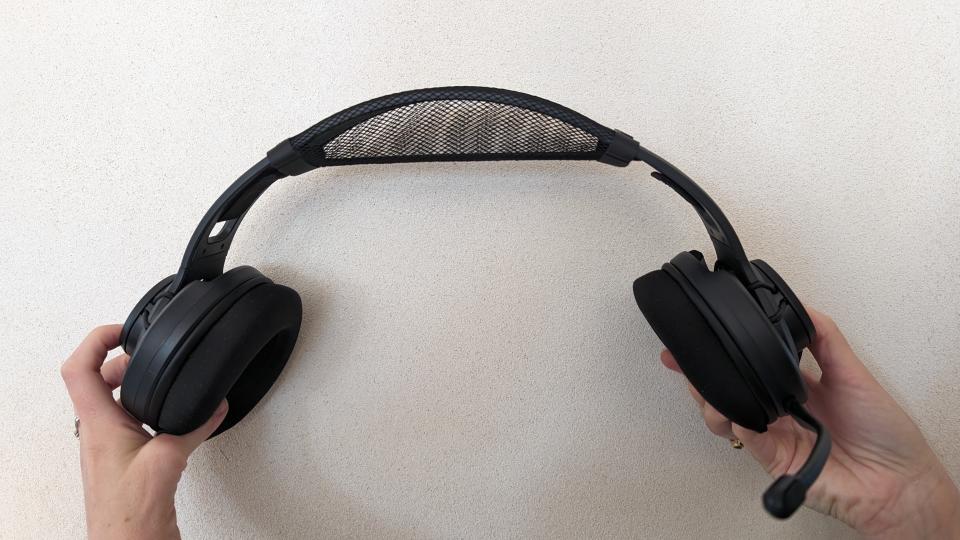
The memory foam cushioned-cups 'float', which is to say, they're not technically connected to the band at all but rather tightly secured via a total of 12 elastic bands. As you can probably imagine, this contributes to the stretchability of the unit as a whole. Securing the two most important components of a headset together in this fashion might seem a bit dubious in theory. While it's yet to be seen how the Atlas Air fares long term, in my view it feels much more secure than cups that pivot from the band, or are held via usually thin metal hinges. I've had headphones worth more than double the Atlas Air break within six months of use based on these mechanisms: maybe some thinking outside the box is welcome.
Over the three weeks I spent using this thing for review—both at my desk gaming and also using it as a Bluetooth set of headphones for walking and commuting—the Atlas Air's featherweight comfort is the quality that stuck out to me. It has other strengths, but boy, does this thing seem to dematerialise once you've placed it on your skull.
But that's just one major aspect of the Atlas Air's pitch; the other is its audiophile chops. It's little wonder that half of the contenders on our list of the best audiophile headphones for gaming are open back. Note that list is for "headphones" too—not gaming headsets. It's a relatively niche demand, and its drawbacks are often too severe to warrant inclusion in a device designed specifically for gaming.
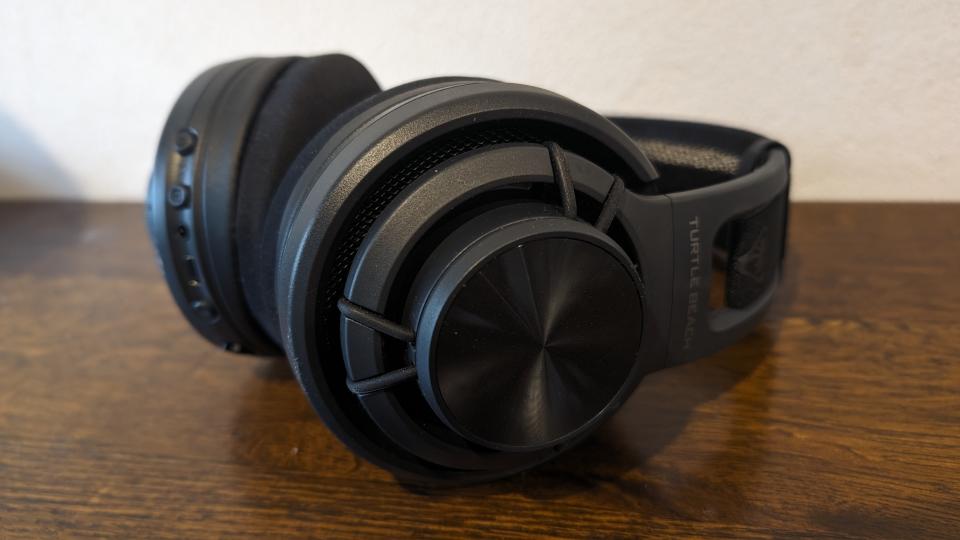

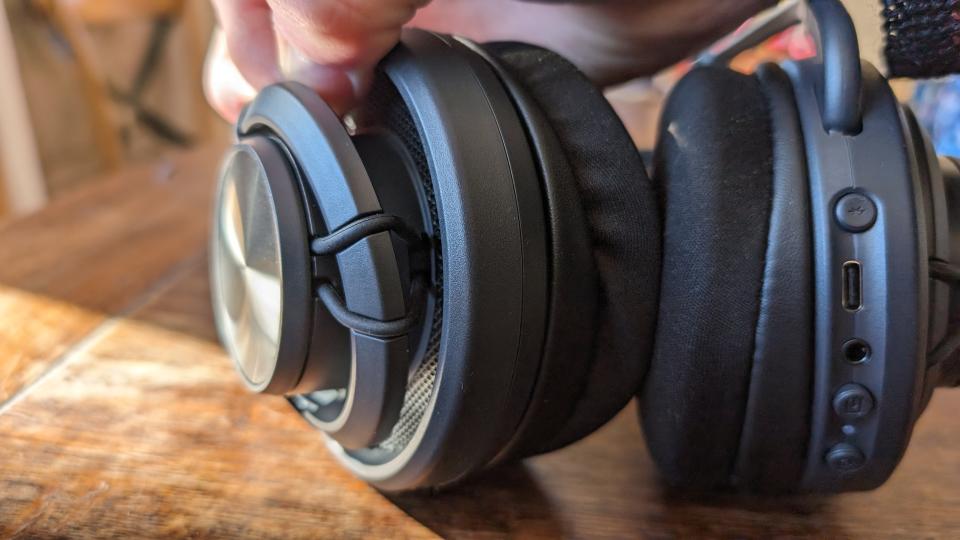
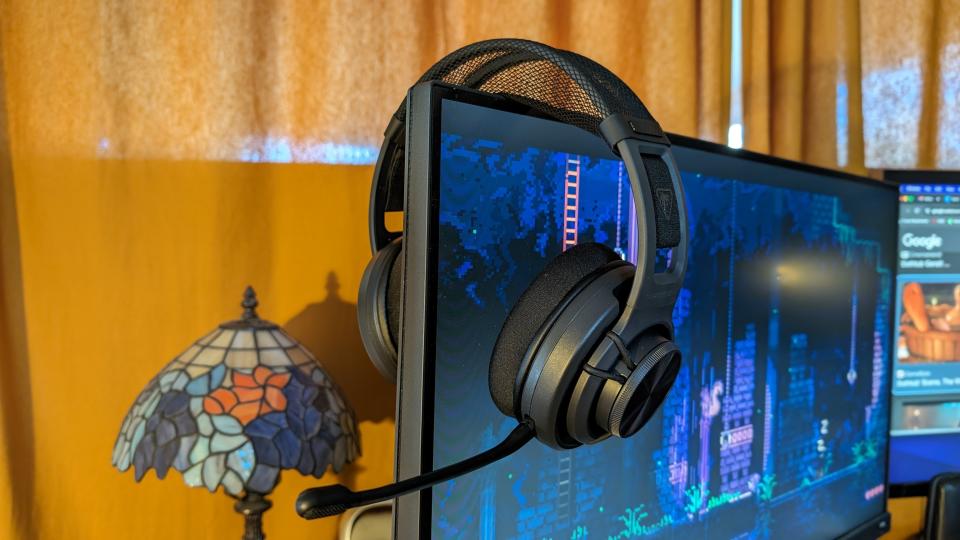
Open back headphones strive for more accurate sound reproduction by doing away with the backside of the speaker enclosure, which eliminates the errant sounds that can arise from an enclosed reverberating speaker. Sure, the sound is more authentically true to its source—almost on par with monitoring headphones—but there's the problem of sound leakage, which is unavoidable under this design principle, thus undermining one of the main reasons we use headsets.
Buy if…
✅ You want accurate 'audiophile' sound: The Atlas Air sounds brilliant thanks to its open-back design, with a huge focus on staying true to the sonic source material.
✅ You're a stickler for comfort: While not the lightest headset on the market, it feels lighter thanks to an unorthodox approach to design.
Don't buy if…
❌ You game in a loud environment: Open-back headsets have the drawback of allowing environmental sounds in, to a higher degree than normal non-ANC headsets.
❌ You game in a very quiet environment: By the same token, if you're worried about sound leaking, open-back isn't a great choice.
But the difference is not insignificant, and it doesn't take an audiophile to notice (though it may take an audiophile to care). Playing Animal Well on my HyperX Cloud III—a headset I use a lot because it's always on my desk—I was impressed by the dank, subterranean atmosphere: the labyrinthine world oozed with an almost overwhelmingly menacing reverberation. Switching to the Atlas Air, the atmosphere of the game basically changed: the ooze took on more detail. Distant coos and cries otherwise obscured by lower frequencies were faintly evident in the distance. It was less a soup of foreboding mood, and more a subtlety-laden environment that I was sonically transported to. Actually, I was in the well.
When closed back headphones are working that's basically the stark difference one should expect. But one should also expect, as a by-product of the open-back design, sound not only leaking out but seeping in. At low volumes this can be a concern, though I was only especially bothered by seepage while using the Atlas Air for a purpose it wasn't expressly designed for: walking down a busy street while listening to ambient music. Given the Bluetooth functionality here (it also has a 2.4GHz wireless dongle which is a much better option for actual gaming, and a 3.5mm jack for the luddites) it's tempting to consider the Atlas Air as perhaps an on-the-go wireless headset in addition to a gaming one. But this is definitely not going to live up to a mid-range set of headphones with active noise cancelling (ANC) capabilities for that use case: ANC and open-back are basically mutually exclusive concepts.
This is, according to Turtle Beach, the first wireless open-back headset "designed for PC". It's of course not the first open-back gaming headset—I reviewed this Audio-Technica model a few years back—but the combination of wireless and open-back is ostensibly new here. As someone who generally prefers open back and can cope with its inherent drawbacks, this combination is extremely welcome. Which leaves one final consideration: how's the mic?
As you can hear in the sample above, it's perfectly clear and, mirroring the qualities of the speakers it's connected to, has no truck with accidental lower frequencies. In other words, it doesn't add bass to my voice like some mics do, and in practice it cuts through with all attendant detail thanks to its 100 to 16,000Hz frequency response.
What's the verdict, then? As someone who prefers the detail and 'truth' of open-back headphones, I love this marriage of that principle with wireless functionality and a great microphone. The fact that this appeal to my niche interests comes in a bizarrely feathery and flexible form factor is a bonus. The Atlas Air is niche, and you probably shouldn't buy an open-back headset without understanding the drawbacks. If your gaming PC is set up in the same room as the family TV, for example, this is probably not for you. But if you've been waiting for a wireless open-back for gaming, well: this is it. And it's done very well.


